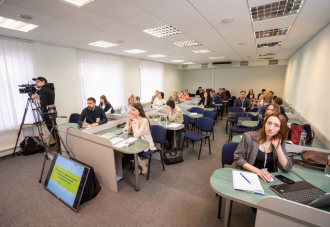The mentoring process involves four major stages: selection and building rapport, coordination of steps, support, and finally the end, wrap-up session.
In previous materials, mentors talked about their own experience at the stages of assessing the mentee’s current situation and potential, shared stories about goal alignment and building a cooperation map and told how you can accompany a mentee on the way to the goal in a crisis setting.
For the final piece in this series, mentors from Mentorship Programs 2020-2022 shared their own vision and experiences of concluding a contract, wrap-up session, and planning or not planning next steps.
The questions were answered by Anastasiia Prokopenko (Access Point NGO), Anastasiia Odintsova (mentor of Programs 1.0 and 2.0), Illia Yeremenko (EcoClub NGO), Alona Lunova (ZMINA Human Rights Center).
What to consider or do at the final stage of supporting organizations through mentorship?
In times of crisis, the Program cannot be 100% completed, communication continues.
According to Anastasiia Prokopenko, they moved to a different level of communication with the mentee: “Because we see that we can continue to be useful, it is not too much effort for us. We are happy to continue to answer any questions and make certain recommendations if they arise. But here we are no longer as proactive.”
Alona Lunova adds with an example of her own mentees: “Our work is not done time-wise, but we will definitely bring it to a logical conclusion, they will have super information about everything they need and useful for advocacy in the future.”
It is important to understand that mentees become stable in their capabilities.
Anastasiia Odintsova was the mentor of the first two Programs. At the stage of completion of cooperation with the mentees, it was important for her to analyze the result and understand what they will be left with after the program and the vectors for their development: “Essentially, we should channel their efforts in the more or less right direction. And then they will choose for themselves where they still need to go, what projects to work with afterwards.”
It is important for mentors to receive feedback, to understand how their actions were useful or useless, and to be given the opportunity to reflect on this.
Illia Yeremenko offers the following action plan for mentors:
- Recall lessons or important points in mentoring that mattered;
- Ask the mentee what was important during that time, so that they remember some things that matter to them;
- Check the sustainability of new practices or achievements developed by mentees and offer them solutions for maintaining sustainability;
- Give advice on where to go next if they need help, advice or contacts of other mentors or capacity building organizations;
- Make a synopsis, a summary, something that will help the mentee quickly recall what they learned during the mentorship program.
“On the one hand, having a mentor prepare a synopsis conflicts with teaching mentees to be self-sufficient. On the other hand, it will increase the chances of remembering the lessons of the mentorship program,” adds the mentor.
What affects mentors’ willingness to continue cooperation?
WHAT AFFECTS MENTORS’ WILLINGNESS TO CONTINUE COOPERATION?
“If I see that the team is trying to implement my recommendations, then I’m willing to build on that. For example, if the team says: “We tried – it didn’t work”, so let’s look for another way together. Or, for example: “‘We tried – it worked, thank you, but we still have a request for a consultation’ so the willingness to continue this cooperation and consultations remains,” explains Anastasiia Prokopenko.
Professionalism is the main thing.
“If I am approached on this subject, I will know that I have certain mentees, I can redirect to them,” says Anastasiia Odintsova. “Professionalism is the main thing for me. And independence, I don’t want them to follow my every step, but I want to have the understanding that I will support them and constantly promote them.”
Motivation.
Alona Lunova adds: “You can be super professional, but if there is no motivation to grow specifically as a team and grow organizationally, then I probably wouldn’t see the point in participating in this program. And obviously, I wouldn’t really want to take the mentees that don’t care.”
Curiosity and responsibility.
Illia Yeremenko defines clear criteria for mentees with whom he is ready to cooperate in the future: “Discipline, ability to deliver on promises, commitment and inspiration in what they do. I want people to be interested and eagerly do their job.”
6 criteria mentors use to assess the efficiency of the mentorship program implemented in a crisis setting:
- Mentees stayed until the end and communication is maintained.
- Readiness for joint planning and implementation of initiatives.
- Mentees believed in themselves.
- Independence of the organization.
- Achievement of the goal that mentees set for themselves during the Program.
- Mentees began to think more consciously about planning their work; they began to reflect on what they were doing and why they were doing it.
Anastasiia Prokopenko talks about the importance of showing some flexibility: “We were changing the focus of the mentee’s activities along the way, what they would do in this program, because external factors had changed completely. We had to be flexible so that the team could figure out for themselves: How they can be useful, what topic could bring them together, and in general – what they are ready or not ready to do now.”
“When they have an understanding of what they need to do in the future, and generally develop self-confidence, that’s when you realize that it worked,” explains Anastasiia Odintsova, who was a mentor in the conditions of restrictions due to the pandemic. According to her, when mentees reach the level of partners, then for her it proves that she has done her job well.
According to Alona Lunova, stability of work, self-confidence and understanding of the next steps are what her mentees go forward with, and this is the measure of the program’s success.
How different are the criteria for evaluating the efficiency of the mentorship program in the conditions of war and Mentorship Program 2020-2021?
“Mentorship Program 3.0 became a real challenge because it was supposed to create, among other things, opportunities for psychological support and understanding,” says Olena Matviichuk, coordinator of the Mentorship Programs. “In the beginning, mentors themselves acted as a support for mentors, teams, and organizations. But in order to be a support for others, you need to be a support for yourself. And the big challenge was finding this support in yourself. Moreover, we added a lot of training on stabilizing the work of organizations. That is, people had a look at their organizations, at their processes, and honestly said: we can or can’t move forward.”
When it comes to quantitative performance, statistics and figures demonstrate sustainability. As for the qualitative indicator, according to Olena Matviichuk, the main criterion is the retention of the team, mentors, mentees.
“We gave the mentees the right to choose: if you want/can, stay in the Program, we are ready to do everything possible for you; if you don’t want, don’t stay, then we are ready to replace your organization,” shares the Mentorship Program 3.0 coordinator. “We have an agreement with the two organizations that were replaced: when we win, if the Program continues to exist, we will take them without a competition. They are really motivated to participate, but most of their team members were mobilized or joined the army as volunteers. One organization is currently in the temporarily occupied territory, and we are waiting for them to return and be able to work safely with them as well.”
Prepared by Kseniia Ditchuk
Mentorship Program to strengthen the advocacy and other capacities of civil society organizations from different parts of Ukraine is part of the Project Ukraine Civil Society Sectoral Support Activity implemented by the Initiative Center to Support Social Action “Ednannia” in partnership with the Ukrainian Center for Independent Political Research (UCIPR) and Centre for Democracy and Rule of Law (CEDEM) with the sincere support of the American people through United States Agency for International Development.



